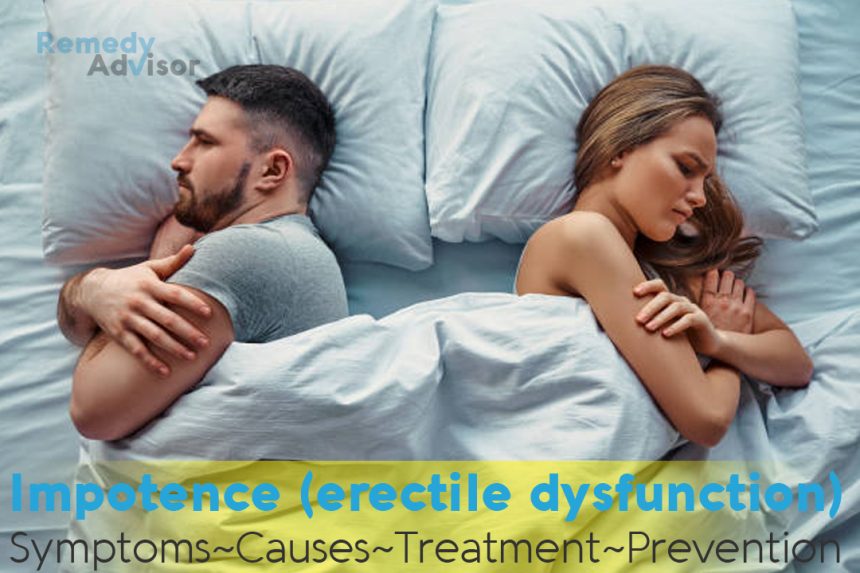What is it
Impotence is the inability to have and maintain an erection sufficient for sexual intercourse. Owing to the negative connotations and misconceptions surrounding the word impotence, the problem is now more commonly called erectile dysfunction, or simply, ED.
According to some experts, ED is the most widespread sexual problem among American men. Nearly all men experience occasional brief episodes of ED because of routine or temporary causes such as fatigue, emotional stress, or illness. For some people erectile problems become chronic. While ED may be connected to diminished sexual desire, in most cases it is not linked to libido (the emotional or psychic component of sexual desire), nor does it affect the ability to have an orgasm.
ED can occur at any age, but it’s more common as men grow olden An estimated 5 percent of American men are impotent at age 40; among those over age 65, the proportion increases to 15 to 25 percent. However, the problem is not an inevitable consequence of aging. The causes are complex, combining physical and psychological factors. While the vast majority of men with ED can be helped, many experts believe that as many as 90 percent do not seek medical assistance because of fear of embarrassment and a belief that nothing can be done medically. This is unfortunate, because once underlying medical conditions and psychological factors are addressed, the frequency and duration of erections nearly always improves. Most men with erection problems don’t have to live with them.
Symptoms
- Persistent difficulty achieving and maintaining an erection for a period long enough to engage in sexual intercourse.
What causes it
Up until just a decade ago, more than 90 percent of all cases of ED were attributed to emotional causes. Now, however, experts estimate that only about 10 percent of cases are purely psychological in origin.
An erection depends upon many physical factors, including the blood supply and nerve tissue in the penis, as well as hormones. Circulatory problems, nerve disorders, heart disease, diabetes, and the side effects of certain medications (tranquilizers, blood pressure medications, anti-depressants, and anti-inflammatory drugs) can contribute to impotence. Smoking, excessive use of alcohol, and low levels of the hormone testosterone may also come into play. Impotence can also result from prostate surgery.
Psychological factors, including stress, depression, and performance anxiety, are now believed to play a limited role in cases of ED, mostly in men under the age of 40. Still, emotions and sexual history may complicate physical factors.
What if you do nothing
Frequent or chronic erectile problems are unlikely to improve without some form of intervention, particularly among men over the age of 50. There are now proven treatments for ED, but out of embarrassment and/or lack of knowledge about medical solutions, many men often choose to do nothing about their ED, which often leads to emotional distress.
Home remedies
If you are having erectile problems, it’s a good idea to seek a medical evaluation. If you have an underlying illness, early treatment may restore sexual potency.
Becoming more informed about sexual matters, undergoing treatment for physical problems, giving up smoking, and reducing excessive alcohol consumption can all contribute to restoring potency. If ED occurs only occasionally, some of the following measures may help address and solve the problem.
Exercise regularly
In addition to improving blood flow, regular moderate exercise for example, walking, swimming, jogging, bicycling, or resistance training helps raise energy levels, boosts physical awareness, and stimulates sexuality. Be aware that bicycle riding carries with it a risk of crossbar injuries to the perineal nerves (located just behind the scrotum) that can lead to ED.
Limit alcohol intake
ED among men in their late 40s and 50s is associated more often with excessive alcohol consumption than with any other single factor. There are plenty of other health-related reasons to avoid excessive drinking, so if it appears to be dampening your sex life, cut back or avoid alcohol altogether before having sex.
Reduce stress in your life
Stress and other emotional difficulties can affect the brain and thereby decrease libido and the ability to achieve or maintain a suitable erection.
Stop smoking
Smoking has not been found to be a direct cause of ED. However, research has found that when smoking is combined with other risk factors, such as heart disease, high blood pressure, and untreated arthritis, ED levels are consistent and extremely high.
Lose weight
Obesity is not a direct cause of ED, but researchers know that being overweight is associated with the onset of diabetes and the buildup of fatty deposits on the interior walls of arteries, and both of these problems are certainly linked with ED.
Relieve your anxieties
Not every sexual experience has to end with orgasm. Thinking that you must achieve a climax can make you anxious, which can result in ED. Instead, you and your partner can agree to focus on caressing and kissing rather than having an orgasm. This may relieve performance anxiety.







